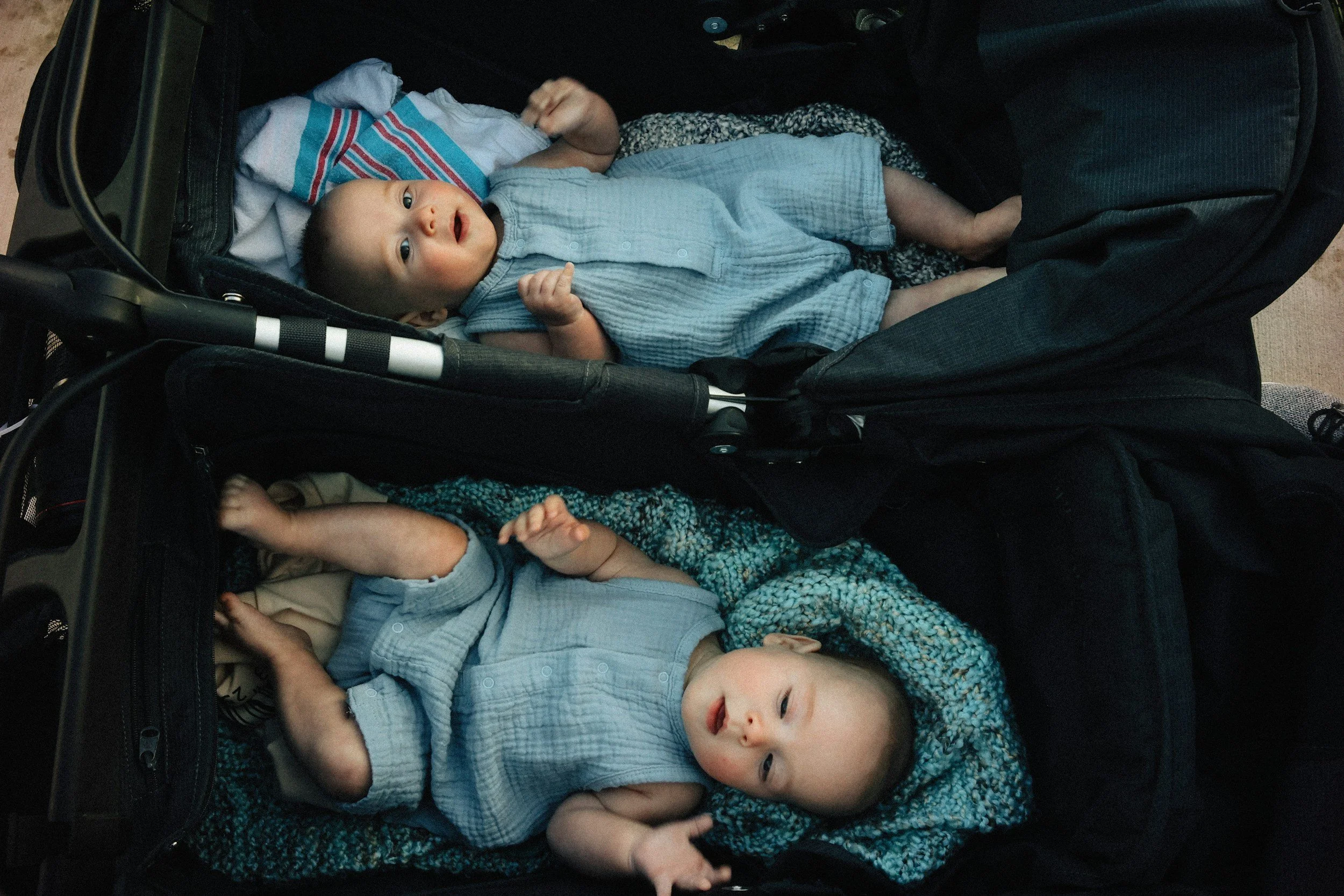Twins, Triplets & More: What I’ve Learned Supporting Families with Multiples
Caring for newborn twins (or more!) is a wild and beautiful ride. As a postpartum doula, I’ve had the privilege of supporting many families with multiples over the years. There’s something uniquely magical about the bond between twins—but let’s be real: the logistics can feel overwhelming, especially in those early weeks.
Here are some of my favorite tried-and-true tips for life with multiples. Whether you’re preparing for twins or already deep in the newborn trenches, I hope this gives you a little more confidence, clarity, and calm.
1. Safe Spaces to Set Them Down—Everywhere
When you’re on your own with two (or more) babies, having multiple safe places to put them down is key. Think: bouncers, bassinets, floor mats, loungers—one in every room you frequent. This lets you rotate them safely if one needs a diaper change or cuddle and the other needs to chill for a moment. It also gives you the chance to use both hands occasionally!
2. Your Carrier is Your Best Friend
Babywearing is a lifesaver with twins. Start with a soft, stretchy wrap when they are newborn and then move to a twin carrier (like the Weego or TwinGo). This allows you to hold both babies, hands-free, while still tending to your home or older siblings. Even just wearing one baby at a time gives the other a break in a swing or on the floor and frees you up to move. Don’t be afraid to practice and adjust—it takes a bit of getting used to, but it’s worth it.
3. Keep Notes (Your Future Self Will Thank You)
Tracking feeds, diaper changes, sleep, and fussiness becomes so much easier when you write things down. Whether it’s a notebook, an app, or a whiteboard on the fridge—find a system that works for you. In those sleep-deprived weeks, your brain will be grateful for the cheat sheet.
4. Synchronize Schedules Early On
One of the best things you can do to protect your rest and sanity is to keep your babies on a synchronized feeding schedule. This doesn’t mean treating them like robots, but if one baby wakes to feed, try offering the breast or bottle to the other soon after—even if they're still sleeping. Getting them into the rhythm of eating and sleeping at the same time will give you more stretches to rest or care for yourself.
5. Treat Them as Individuals
That being said, remember that they are different people. It’s natural to compare—especially when everything happens side-by-side. But try to resist the urge to view or talk about babies in comparison to each other (Example “A is fussy and B is so easy” or “A is feeding 70ml, B should also”). Each baby is their own person, and honoring their unique personalities, rhythms, and needs will help them thrive. It also takes some of the pressure off you to make everything perfectly balanced all the time.
6. Plan for Nights—Before They Arrive
With a singleton, you might get 2–3 hour stretches of sleep. With twins, even on a perfectly timed schedule, the odds of both babies waking, feeding, and falling asleep at exactly the same time are pretty low—especially in those first 6–8 weeks.
Some nights might mean you’re alternating between two fussy, overtired babies for hours, especially after vaccines or during a cold. It’s a different kind of sleep deprivation, and it can wear on even the most prepared parent. That’s why I highly recommend making a realistic overnight support plan before your babies are born. Talk to your partner, relatives, or a postpartum doula. Consider rotating shifts, hiring help, or at the very least, mapping out who’s “on duty” when.
Sleep deprivation with multiples isn’t something to just power through—it deserves real strategy and support.
7. Postpartum Recovery with Multiples
Recovering from birth while caring for two (or more) newborns is a major feat—and it deserves extra care. The cesarean birth rate is higher with multiples, and even with a vaginal birth, the healing can be more intense due to the strain of carrying more than one baby. Add in the wild hormonal fluctuations, and the risk of postpartum mood disorders (like anxiety or depression) can also be higher.
Please know: none of this means something is wrong with you. It means your body and brain are doing a lot, and it’s okay to need support.
Some small-but-mighty tools that help:
Get outside daily, even if it’s just sitting on the front steps with a coffee and the babies in a stroller.
Ask for help. With meals, laundry, middle-of-the-night feeds—anything. If someone offers, say yes.
Talk to someone. A postpartum doula, therapist, or other twin parents can remind you that you’re not alone.
Protect your rest wherever possible. A 20-minute nap is worth it. A night nurse or overnight doula is worth it. You are worth it.
8. Find Your Twin Parent Community
There’s something special about connecting with other families who get it. Whether it’s a local multiples group, an online forum, or the twin parent you see at the park—don’t be afraid to reach out. Solidarity, tips, hand-me-downs, and emotional support are gold in this season.
You Don’t Have to Do It Alone
Supporting families with multiples is one of the most rewarding parts of my work. It’s intense—but you are absolutely capable. And you deserve just as much support as your babies do. If you're navigating the early weeks with twins or triplets and feeling stretched thin, let’s talk. I offer overnight newborn care and postpartum support tailored to the unique needs of families with multiples.


